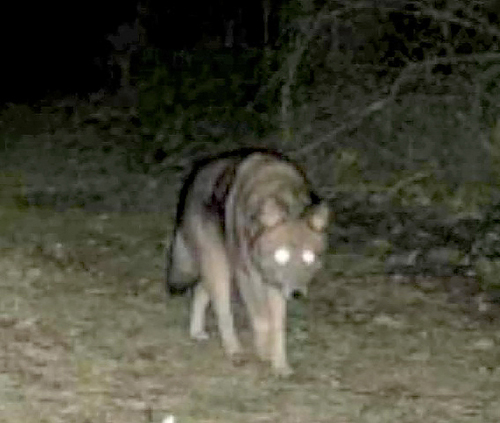Tips to stay safe
By Julia Train
Coyotes are out and about in Atlantic County.
On Jan. 18, Nicole Mammucari posted on the “Original Egg Harbor Township Area Happenings 08234” Facebook group a photo of a coyote, captioned, “Pine Avenue last night. watch your pets.”
Posts like Mammucari’s may be popping up on your timeline more often in the coming weeks, as coyote mating season is upon us until March.
With the gestation period following the mating season and lasting 63 days, pups are born throughout April to mid-May.
According to the New Jersey Department of Fish and Wildlife, “historically, the coyote is not native to New Jersey. The coyote extended its range north and east across Canada from the midwest. DNA studies of the species show that those coyotes bred with gray wolves, emerged into the New England states, and have extended their range south through New Jersey.”

Coyotes can live in basically any habitat, like forests, grasslands, deserts, and swamps because they’re extremely adaptable. Their tolerance for human activities means that they can also be found in suburban and urban settings.
The Rutgers New Jersey Agricultural Experiment Station stated, “One of the critical factors contributing to the adaptability of coyotes is their diverse diet.”
Although coyotes would rather eat meat, they consume a wide range of prey. Their diet ranges from animals as small as insects to beavers, raccoons, and young or injured deer. They are opportunistic omnivores, which means they consume a variety of fruits, nuts and eggs when meat is not available.
Here are some guidelines and precautions that can help reduce the likelihood of conflicts with coyotes, according to the New Jersey Department of Fish and Wildlife:
- Never feed a coyote. Feeding them puts pets and other residents in the neighborhood at risk. Additionally, feeding pet cats and/or wild cats outdoors can attract coyotes because they feed on the pet food and prey upon the cats.
- Put garbage away in tightly closed containers that cannot be tipped over.
- Remove sources of water, especially in dry climates.
- Bring pets in at night.
- Put away bird feeders at night to avoid attracting rodents and other coyote prey.
- Provide secure enclosures for rabbits, poultry, and other farm animals.
- Pick up fallen fruit and cover compost piles.
Although it’s almost unheard of, coyotes have attacked humans. Here are some precautions the New Jersey Department of Fish and Wildlife provided that can be taken to make sure you and your family remain safe.
- Install motion-sensitive lighting around the house.
- Clear brush and dense weeds from around dwellings. This reduces protective cover for coyotes and makes the area less attractive to rodents and rabbits. Coyotes, as well as other predators, are attracted to areas where rodents are concentrated like woodpiles.
- If coyotes are present, make sure they know they’re not welcome. Make loud noises, blast a canned air siren, throw rocks, or spray them with a garden hose.
New Jersey Department of Fish and Wildlife also says that if you come in contact with a coyote, you should immediately contact your local police and NJ Fish and Wildlife at 908-735-8793. Outside of normal business hours, call the DEP Hotline at 877-WARN-DEP.

















